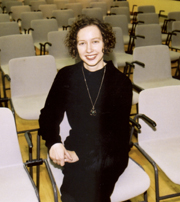
Stephanie Bolster
|
by
Barbara Black
Governor-General’s Literary
Award winner Stephanie Bolster, who teaches creative writing in the English
Department, has produced another fine collection of her poetry for McClelland
and Stewart, called simply Pavilion. We interviewed her by e-mail.
Many of these poems have the hallucinatory, jump-cut quality of dreams.
Did they originate in dreams?
Stephanie Bolster replies: The poems in the Antique Glass section
originated in dreams, yes. A few dream images do appear in other poems,
but my intent was not simply to render dreams but to render my inner world;
the way my mind and emotions work.
Although there’s always a point in the writing process when the conscious
mind steps in, I tried to delay that moment as long as possible so as to
discover connections between images that preoccupy me, rather than imposing
meaning from outside. I would say that this is a more intuitive book than
my past ones.
There’s a good deal here about your childhood home. Where was it, and
have you found it a rich source of inspiration?
I grew up in Burnaby, B.C., a suburb of Vancouver. Not a particularly noteworthy
place in itself — though the landscape shaped me significantly —
but it was my first place, and my parents still live there. Writing the
poems, I was interested in the fact that, for many of us, the places in
which we grow up retain a primary focus even though we did not choose them
and we might not be drawn to them if we encountered them as adults.
After moving away from B.C., I found that the distance allowed me to restore
my parents’ house, in my mind, to the house of my childhood. Even when
I visit, that split exists; it’s as though that earlier version of
the house is still there, waiting, if only I could find a way in.
On a larger level, “stanza” means room, and I saw these small
poems — of sonnet length — as rooms. All of which is to affirm
that this ordinary house has been a surprisingly rich source of inspiration.
In the section called The Japanese Pavilion, you seem to be recreating a
tourist’s Japan, or a newspaper-reader’s Japan. What’s your
feeling about Japan, and why the reference to the pavilion?
I’ve never been to Japan, and couldn’t have written this particular
poem if I had been there. You’re correct in saying that the poem is
about Japan-at-a-distance; it’s about the idea of Japan (in particular,
my idea of Japan) rather than about the country itself.
As a child, I was taken to the Nitobe Memorial Garden, a Japanese garden
on the Univeristy of British Columbia campus that is considered the most
authentic such garden outside Japan, and I felt utterly at home there in
its carefully orchestrated, enclosed spaces. The garden retains that allure
for me, as does Japan, yet I realize that just as the garden is an idealized
view of nature, so “my Japan” is a skewed, particular vision of
the country.
I believe that it’s a country that is almost impossible to know from
inside if one isn’t from there, so I approached the poem in the most
authentic way possible: as a complete outsider.
The pavilion is a number of things, the most relevant of which in this particular
context is that it is elusive. It is the destination one sees in the distance
but never reaches, or reaches only in death. The epitome of the ideal. It’s
also, of course, in the tourist sense, the version of Japan that one visits
at a World’s Fair: selective, artificial, temporary.
Stephanie Bolster will be reading from her work at the (W)rites of Spring,
a benefit for the League of Canadian Poets, on Monday, April 22. The event
will be held at Les Terrasses Saint-Sulpice, 1680 St. Denis St.
Selections from Pavilion,
by Stephanie Bolster
My cerebrum’s pleated into tiny Fujis.
At the base, a peach orchard nearly in flower: a thousand
Deer-limbed trees brushed with blushes. Probe that region
Of my brain and I will know the kneeling and the tea.
- from the section The Japanese Pavilion
Vermeer, Impoverished Father of Eleven Surviving Children, Paints Our
House
Not small enough to let in the light of an entire
afternoon. Though we complain, we have too much
time to deserve depiction contemplating
adjustments to a balance that weighs pearls.
No carillon interrupts every quarter-hour
from across a black canal. He might paint us
a blur: hallway collapsed to twelve inchs of frenzy,
cutlery encrusted on counters. He might render flame
between my roving eyes and an assembling page.
Children would burst from each doorway, dusty
dogs salivate in corners, pieces of broken water jugs
abound because I haven’t spun enough
to find the centre; the stillness that turns
the house into a sacred place for centuries.
Basement
Each friend feared something down there;
the snowy owl my uncle had shot
and stuffed; the mouth that taunted
from the armchair’s patter.
In dreams, I pulled a rope
beside the fireplace. The floor rolled back
to show a pool. Does the lost girl —
far in a suburb with a daughter
and breast cancer — think of us there?
We made up things to fear. The pool
was clear. No tragedy entered
my childhood, though that is where
it would have happened. I wait for it;
or for some rapture, also unfulfilled.
|
|
|



